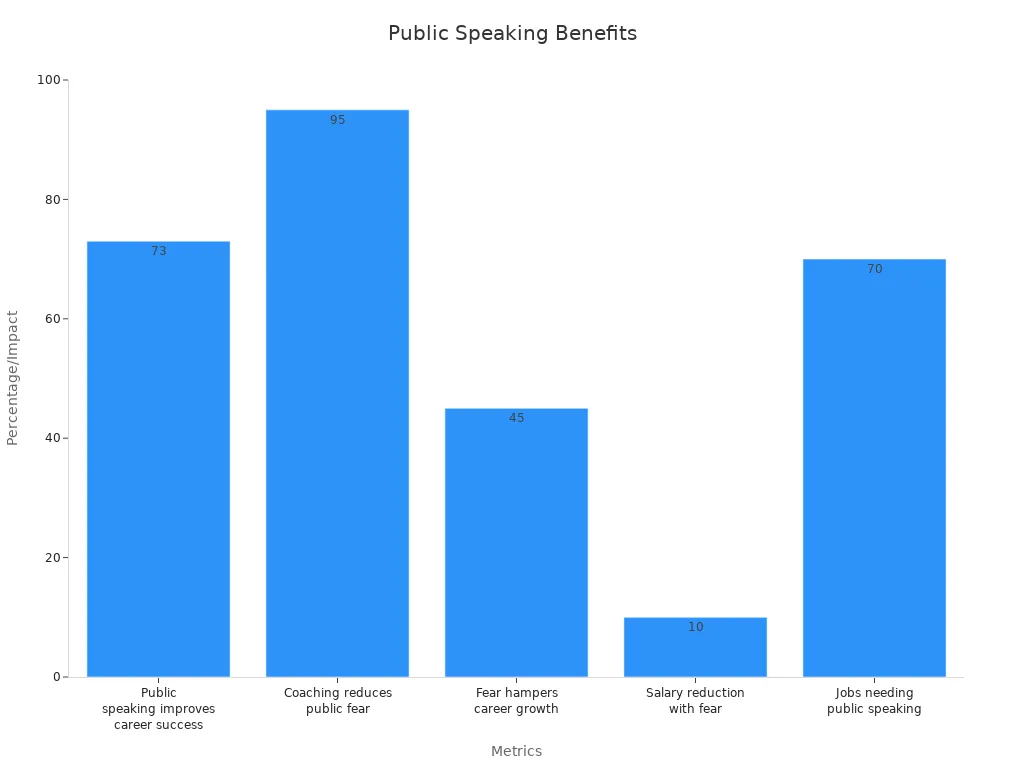Public Speaking Academy

Public Speaking Benefits
Skill Growth
You get important skills when you join a public speaking academy. These programs show you how to organize your ideas. You learn to speak clearly and use your voice well. You also learn to change your message for different groups. Research shows that training helps you talk better and feel less nervous. It also helps you get ready for many speaking events. You practice extemporaneous speaking, so you learn to talk without reading notes. You also learn to use facts and stories to explain your ideas. These skills help you in school, at work, and every day.
Statistic Description | Percentage / Impact |
|---|---|
Individuals who believe public speaking skills improve career success | |
Respondents who say fear of public speaking can be overcome with coaching | 95% |
Individuals who feel fear of public speaking hampers career growth | 45% |
Salary reduction for people who fear public speaking | Approximately 10% less annually |
Jobs requiring public speaking skills | 70% |
Tip: Practicing public speaking often helps you become a better communicator in all parts of life.
Confidence
You gain confidence each time you talk in front of others. Public speaking academies give you a safe place to practice and get help. Studies show that training, even with virtual reality, lowers anxiety and builds confidence. In one study, people who practiced with a virtual audience felt more confident during real talks. Another study found that students who did public speaking projects felt better about themselves and did better. If you start with low confidence, you can see the biggest changes.

Note: Confidence grows with practice. Each time you speak, you feel more comfortable and sure of yourself.
Networking
You meet new people when you join a public speaking academy. You connect with classmates, teachers, and guest speakers. These connections help you build a strong network. You learn to listen, give feedback, and help others. You also get to share your ideas and learn from other people. Networking in these places often leads to friends, study groups, and even jobs. You join a group that values growth and communication.
You practice teamwork during group activities.
You get feedback from classmates and mentors.
You grow your circle by going to events and workshops.
Career Impact
Public speaking skills help you in your career. Many jobs need you to share ideas, lead meetings, or talk to groups. About 70% of jobs need some public speaking. People who are afraid to speak in public often earn about 10% less each year. When you get better at speaking, you have more chances to do well at work. You stand out in interviews and presentations. Employers notice when you talk clearly and with confidence. You also become a better leader and team player.
Alert: Strong public speaking skills can help you earn more and move up faster in your career.
Key Takeaways
When you join a public speaking academy, you learn to speak clearly. You also learn how to organize your ideas. It helps you feel less nervous. Practicing a lot helps you feel more confident. It makes talking in front of people easier. You can meet new friends in classes and workshops. You get advice from others and grow your network. Good public speaking skills help you get better jobs. They can also help you make more money. Pick a program that matches your goals. Make sure it has good teachers. It should let you practice in ways that help you.
How It Works

Curriculum
Most public speaking academies have a set curriculum. These programs help you learn step by step. You begin with simple things, like how to organize your ideas and use your voice. Later, you learn harder skills, like telling stories and answering questions from the audience. Many famous schools use different course plans to help you get better.
Here is a table that shows how some well-known programs set up their courses:
Institution | Course/Program Name | Structure & Components | Focus Areas & Features |
|---|---|---|---|
Dale Carnegie Training | Effective Communications and Human Relations | Interactive sessions, practical exercises, personalized feedback | Builds self-confidence, interpersonal skills, overcoming fear, engaging audience, impactful messaging |
Toastmasters International | Pathways Program | Multiple learning paths, incremental skill-building projects, regular club meetings for practice and feedback | Supportive environment, practical experience, peer feedback, confidence building |
Harvard Extension School | Public Speaking for Business Leaders | Academic courses combining public speaking with management concepts | Practical communication techniques, expert faculty, networking opportunities |
Coursera (University of Washington) | Dynamic Public Speaking Specialization | Four courses: Introduction to Public Speaking, Speaking to Inform, Speaking to Persuade, Speaking to Inspire | Self-paced, flexible, theoretical instruction combined with practical speech practice |
TED | Public Speaking Masterclass | Self-paced masterclass with animations, video clips, exercises, and speech practice | Storytelling, audience engagement, body language, voice techniques, submission opportunity |
Speaker Nation | One Talk Workshop | Live 3-day workshop with practical drills | Designing compelling talks, psychological techniques, speech practice |
You can pick in-person classes, online lessons, short workshops, or clubs that meet often. Each type gives you a new way to learn and practice.
Tip: Try out different types to find what helps you learn best.
Teaching Styles
Teachers use many ways to help you learn public speaking. Some teachers talk and explain ideas. Others use group work or pretend play. You might also watch videos or join class talks. Good teachers change how they teach to fit the class. This keeps you interested and helps you learn more.
A study showed that one teaching style does not work for everyone. Teachers who switch up their methods and keep lessons active help students stay excited. You will probably see many teaching styles in your classes. This mix helps you learn new skills and makes class fun.
Note: If you feel bored or confused, tell your teacher. They can change how they teach to help you.
Practice
Practice is very important if you want to be a better speaker. You will get lots of chances to speak in front of people. Every time you practice, you get better. Here are some good ways to make your practice work well:
Make a clear goal for each time you practice.
Time your speeches to check if they fit the time limit.
Split your speech into parts and practice each part alone.
Ask classmates or mentors for feedback.
Use a checklist to check things like how clear you are, your speed, and how you connect with the audience.
Think about what went well and what you can do better next time.
You can practice in clubs, workshops, or online meetings. Some programs, like Toastmasters, have regular meetings for practice. Others, like Speaker Nation, use short and intense workshops.
Alert: The more you practice, the more confident and skilled you get.
Feedback
Feedback helps you become a better speaker. You will get feedback from teachers, classmates, and sometimes from yourself. Each kind of feedback has its own good points. Here is a table that shows different feedback types and what research says about them:
Feedback Methodology | Evidence Type | Key Findings |
|---|---|---|
Teacher Feedback | Empirical comparative studies | Shows the most improvement in public speaking performance. High-quality feedback helps you learn faster. |
Peer Feedback | Empirical comparative studies | Encourages discussion and self-reflection. Can be very helpful, but results may vary. |
Self-Feedback | Empirical comparative studies | Usually leads to the least improvement, but still useful for self-awareness. |
Interactive Face-to-Face Dialogic Feedback | Empirical studies and literature review | More effective than written feedback. Helps you understand and remember more. |
Orchestration of Multiple Feedback Sources | Conceptual and empirical insights | Combining feedback from teachers, peers, and yourself gives the best results. |
Public Speaking Feedback Engagement Scale (PSFES) | Instrument development and validation | Measures how engaged you are with feedback. Helps teachers give better feedback. |
You should listen to feedback and use it to get better. Try to get feedback from different people. This will help you see what you do well and what you need to work on.
Tip: Always ask questions if you do not get the feedback. This helps you learn faster.
Choosing an Academy

Reputation
Pick an academy with a good reputation. Find schools with strong reviews and happy students. Groups like Public Speaking Academy Singapore, Toastmasters, and Enspire Academy are well-known. Accreditation means the program meets quality rules. You can look for awards or partnerships with trusted groups. Reading testimonials shows how people improved their skills.
Tip: Check for new reviews and ask about graduate success stories.
Courses
Every academy has different courses. Some are for beginners, and some are for advanced speakers. Choose a course that matches your skill level and goals. The table below compares top online academies. It lists course time, support, certificates, and price. This helps you pick a program that fits your needs and schedule.
Academy | Course Length & Format | Support Options | Accreditation/Certification | Pricing |
|---|---|---|---|---|
Coursera | Over 60 hours, 4-course specialization | Discussion forums for interaction | Certificate upon completion | $49/month |
Udemy | 16 hours of on-demand video, 25 guides, 50 templates | Direct messaging to instructors, discussion groups | Certificate upon completion | $119.99 one-time |
Skillshare | 1 hour, videos and projects | Discussion forum | Not available | $32/month or $168/year |
LinkedIn Learning | 1-2 hours, videos, exercises, quizzes | Discussion forum | Certificate upon completion | $39.99/month or $239.88/year |
Knowadays | 8 hours, 12 video lessons, 62 pages worksheets | Online tutor access, 24/7 email support | Professional recorded talk + certificate | $99 one-time |
Instructors
Good instructors help you learn faster. Look for teachers with experience in Public Speaking and teaching. Studies show instructor feedback helps, but your own confidence matters most. When you believe in your skills, you improve more. Some teachers give private feedback, and others use group sessions. Ask about the teacher’s background and style before you join.
Note: Pick an academy where you feel safe asking questions and getting feedback.
Flexibility
Flexible programs make learning easier. Many academies have both in-person and online classes. You can choose what fits your schedule best. Experts say flexible courses, like HyFlex, help more students finish. Short, frequent practice works better than long, rare practice. This lets you learn at your own speed and practice more.
Pick live classes or recorded lessons.
Go to sessions in the morning, afternoon, or evening.
Practice speeches as much as you need.
Cost
Compare costs before you choose. Some academies charge monthly, and others have a one-time fee. Prices go from $32 per month to $119 for a full course. Think about what you get for the price, like support, certificates, and extra help. Sometimes, paying more gives you better support and results.
Alert: Always see if the academy has a free trial or money-back guarantee.
Getting Started
Enrollment
You can begin by signing up for a program that fits your needs. Most academies have easy online forms to join. Some will ask you to pick your skill level or class time. You might need to give your name and contact info. Many programs let you try a free class before you decide. If you have questions, contact the academy’s support team. They will help you choose the right course and answer your questions.
Tip: See if the academy has flexible times or trial classes. This helps you find what works best for how you learn.
Preparation
Getting ready helps you feel sure before your first class. Many students feel nervous at first. You can use helpful tips to feel better and do well. A study showed that students who practiced body awareness, gesture control, visualization, and anxiety re-labeling improved a lot. They felt less nervous and used better body language.
Preparation Strategy | Benefit |
|---|---|
Body awareness | Helps you control your movements |
Gesture mastery | Makes your message clearer |
Visualization | Builds confidence before speaking |
Anxiety re-labeling | Turns nerves into positive energy |
Rehearsal and exposure | Reduces fear through practice |
It is normal to feel nervous when speaking.
Practice and getting ready help you feel less anxious.
You can use nervous energy to stay alert.
Goal Setting
Making clear goals helps you see how you grow in Public Speaking. Experts say to use SMART goals. These are Specific, Measurable, Achievable, Relevant, and Time-bound. Start by looking at your skills now. Break big goals into small steps. After each speech, think about what went well and what you can do better. Ask for feedback from classmates or teachers. Change your goals as you get better.
Use SMART goals to know what to do next.
Check your strengths and weaknesses first.
Make small, clear goals.
Get feedback after every session.
Think and change your goals often.
Note: Try to get better at audience engagement or speech clarity in a set time. This helps you see real progress.
Joining a speaking academy has lots of benefits.
You become more confident and learn to share your ideas better.
You get better at talking, leading, and telling stories.
Coaching helps you feel less scared on stage and improve quickly.
Flexible programs let you pick times and ways that work for you.
Most people feel nervous about speaking, but training helps you do well. Think about what you want and look at different academies. Take the first step and begin your journey now!
FAQ
How long does it take to see improvement?
You can notice progress in a few weeks if you practice often. Many students feel more confident after just a few sessions. Your growth depends on how much you practice and use feedback.
Do I need any experience before joining?
No experience is needed. You can start as a beginner. The academy will guide you step by step. You will learn basic skills first and move to harder tasks as you improve.
What if I feel nervous about speaking?
Feeling nervous is normal. You can use breathing exercises and practice in a safe space. Many students feel less anxious after a few classes. Teachers will help you build confidence.
Can I join classes online?
Yes, many academies offer online classes. You can join from home. Online lessons use video calls, recorded lectures, and group chats. This makes learning easy and flexible.
Will I get a certificate after finishing the course?
Most academies give you a certificate when you finish. This shows you completed the course. You can use it for school, work, or your resume.
